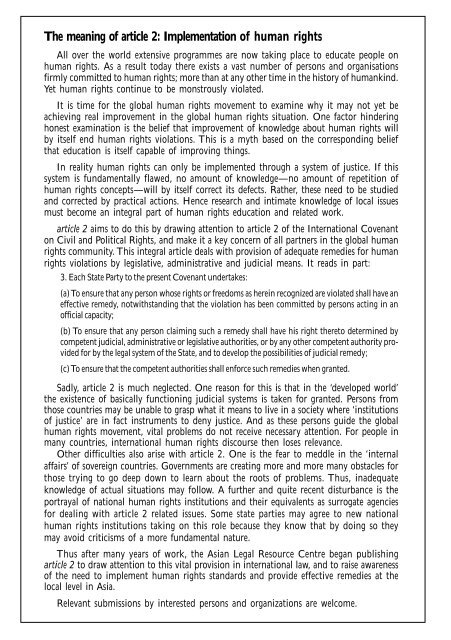of the Philippines the criminal justice system is - Article 2
of the Philippines the criminal justice system is - Article 2
of the Philippines the criminal justice system is - Article 2
You also want an ePaper? Increase the reach of your titles
YUMPU automatically turns print PDFs into web optimized ePapers that Google loves.
The meaning <strong>of</strong> article 2: Implementation <strong>of</strong> human rights<br />
All over <strong>the</strong> world extensive programmes are now taking place to educate people on<br />
human rights. As a result today <strong>the</strong>re ex<strong>is</strong>ts a vast number <strong>of</strong> persons and organ<strong>is</strong>ations<br />
firmly committed to human rights; more than at any o<strong>the</strong>r time in <strong>the</strong> h<strong>is</strong>tory <strong>of</strong> humankind.<br />
Yet human rights continue to be monstrously violated.<br />
It <strong>is</strong> time for <strong>the</strong> global human rights movement to examine why it may not yet be<br />
achieving real improvement in <strong>the</strong> global human rights situation. One factor hindering<br />
honest examination <strong>is</strong> <strong>the</strong> belief that improvement <strong>of</strong> knowledge about human rights will<br />
by itself end human rights violations. Th<strong>is</strong> <strong>is</strong> a myth based on <strong>the</strong> corresponding belief<br />
that education <strong>is</strong> itself capable <strong>of</strong> improving things.<br />
In reality human rights can only be implemented through a <strong>system</strong> <strong>of</strong> <strong>justice</strong>. If th<strong>is</strong><br />
<strong>system</strong> <strong>is</strong> fundamentally flawed, no amount <strong>of</strong> knowledge—no amount <strong>of</strong> repetition <strong>of</strong><br />
human rights concepts—will by itself correct its defects. Ra<strong>the</strong>r, <strong>the</strong>se need to be studied<br />
and corrected by practical actions. Hence research and intimate knowledge <strong>of</strong> local <strong>is</strong>sues<br />
must become an integral part <strong>of</strong> human rights education and related work.<br />
article 2 aims to do th<strong>is</strong> by drawing attention to article 2 <strong>of</strong> <strong>the</strong> International Covenant<br />
on Civil and Political Rights, and make it a key concern <strong>of</strong> all partners in <strong>the</strong> global human<br />
rights community. Th<strong>is</strong> integral article deals with prov<strong>is</strong>ion <strong>of</strong> adequate remedies for human<br />
rights violations by leg<strong>is</strong>lative, admin<strong>is</strong>trative and judicial means. It reads in part:<br />
3. Each State Party to <strong>the</strong> present Covenant undertakes:<br />
(a) To ensure that any person whose rights or freedoms as herein recognized are violated shall have an<br />
effective remedy, notwithstanding that <strong>the</strong> violation has been committed by persons acting in an<br />
<strong>of</strong>ficial capacity;<br />
(b) To ensure that any person claiming such a remedy shall have h<strong>is</strong> right <strong>the</strong>reto determined by<br />
competent judicial, admin<strong>is</strong>trative or leg<strong>is</strong>lative authorities, or by any o<strong>the</strong>r competent authority provided<br />
for by <strong>the</strong> legal <strong>system</strong> <strong>of</strong> <strong>the</strong> State, and to develop <strong>the</strong> possibilities <strong>of</strong> judicial remedy;<br />
(c) To ensure that <strong>the</strong> competent authorities shall enforce such remedies when granted.<br />
Sadly, article 2 <strong>is</strong> much neglected. One reason for th<strong>is</strong> <strong>is</strong> that in <strong>the</strong> ‘developed world’<br />
<strong>the</strong> ex<strong>is</strong>tence <strong>of</strong> basically functioning judicial <strong>system</strong>s <strong>is</strong> taken for granted. Persons from<br />
those countries may be unable to grasp what it means to live in a society where ‘institutions<br />
<strong>of</strong> <strong>justice</strong>’ are in fact instruments to deny <strong>justice</strong>. And as <strong>the</strong>se persons guide <strong>the</strong> global<br />
human rights movement, vital problems do not receive necessary attention. For people in<br />
many countries, international human rights d<strong>is</strong>course <strong>the</strong>n loses relevance.<br />
O<strong>the</strong>r difficulties also ar<strong>is</strong>e with article 2. One <strong>is</strong> <strong>the</strong> fear to meddle in <strong>the</strong> ‘internal<br />
affairs’ <strong>of</strong> sovereign countries. Governments are creating more and more many obstacles for<br />
those trying to go deep down to learn about <strong>the</strong> roots <strong>of</strong> problems. Thus, inadequate<br />
knowledge <strong>of</strong> actual situations may follow. A fur<strong>the</strong>r and quite recent d<strong>is</strong>turbance <strong>is</strong> <strong>the</strong><br />
portrayal <strong>of</strong> national human rights institutions and <strong>the</strong>ir equivalents as surrogate agencies<br />
for dealing with article 2 related <strong>is</strong>sues. Some state parties may agree to new national<br />
human rights institutions taking on th<strong>is</strong> role because <strong>the</strong>y know that by doing so <strong>the</strong>y<br />
may avoid critic<strong>is</strong>ms <strong>of</strong> a more fundamental nature.<br />
Thus after many years <strong>of</strong> work, <strong>the</strong> Asian Legal Resource Centre began publ<strong>is</strong>hing<br />
article 2 to draw attention to th<strong>is</strong> vital prov<strong>is</strong>ion in international law, and to ra<strong>is</strong>e awareness<br />
<strong>of</strong> <strong>the</strong> need to implement human rights standards and provide effective remedies at <strong>the</strong><br />
local level in Asia.<br />
Relevant subm<strong>is</strong>sions by interested persons and organizations are welcome.

















